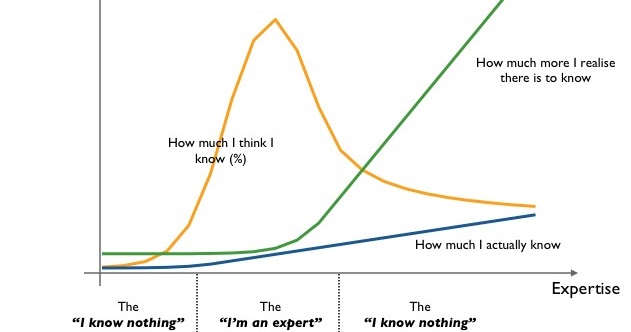There are a lot of terms that are used to describe consultants these days. Some of the more common ones are “master,” “specialist,” “authority,” and even “sage” or “maven” (ugh).
But the two most common terms I see are “expert” and “guru.” Sometimes these terms are used interchangeably, but depending on who you’re talking to, most people mean slightly different things when using them.
So, let’s first clarify what the terms mean and how, specifically, I will be using them in this post.
According to the Merriam-Webster Dictionary, an “expert” is “one with the special skill or knowledge representing mastery of a particular subject.” In other words, you’re very knowledgeable about something and/or very good at something. There’s very little disagreement about that definition.
“Guru” is not quite so clear-cut. According to Merriam-Webster, the first definition of guru is the original one: “a personal religious teacher and spiritual guide in Hinduism.” Obviously, that’s not the definition we’re referring to when we’re talking about someone running a consulting business.
It’s the second definition that’s pertinent here, but there are three sub-definitions, and they actually serve to muddle the waters a bit. Here are the three sub-definitions:
2a. A teacher and especially intellectual guide in matters of fundamental concern.
2b. One who is an acknowledged leader or chief proponent.
2c. A person with knowledge or expertise.
You can see how 2a grew out of the first definition (religious teacher and spiritual guide) when taken to the secular plane. Definition 2b focuses on how others see the person labeled as a guru. And then, unfortunately, definition 2c is pretty much the same as the definition of “expert” (this is where the overlap and confusion comes in).
For the purpose of this post, I will be using definition 2b as my definition of a “guru”—someone who is recognized by others as a leader or chief proponent of something (like a particular approach to teaching, for example).
Using this definition will allow us to distinguish the key difference between an expert and a guru and talk about how consultants should proceed toward achieving guru status in their fields.
Yes, You Need to be an Expert—But That’s Not Enough
So, we’ve established that the key difference between an expert and a guru (at least how I’m using it) is that an expert is what you are (if you indeed are one), while a guru is what others see you as (if they do indeed see you this way).
You have to be an expert before you can be a good educational consultant. That’s a starting point, a given. If you don’t know more about a particular area than most people in your field, you really don’t have anything special to share and you have no real reason to have a consulting business in the first place.
But just because you’re an expert doesn’t mean you’re going to be successful in your business. There are thousands of consultants sitting at home, slaving away to create presentations no one will ever see or write books no one will ever buy.
And why won’t people see the presentations or buy the books? Because these consultants are experts, but they’re not gurus. To really take your business to the next level, you have to achieve guru status. You have to become recognized by others as a leader in your field.
The question is, “How?”
Never fear, many others have gone down this path before you, and there’s a fairly well-documented way to get from point A (being just an expert) to point B (becoming a guru with a large following). Here are the steps:
7 Steps for Becoming a Guru in Your Field
1. Become an expert. Yeah, yeah, I know. I just said above that being an expert is just a starting point, but I put it in this list again because I wanted to emphasize once more that you HAVE to be an expert before you even think about how to become a guru. Who’s going to follow you if you don’t have a strongly established area of expertise? Right, no one.
So, if you really haven’t yet carved out an area of expertise, don’t go any farther. Do not pass “Go.” Do not collect $200. Do whatever you need to do (read, talk to experts, do classroom research) and come up with an area of expertise worth sharing with others. Then come back to read the rest of the list. Go on, I’ll wait…
OK, let’s assume you’ve done that. On to the next steps in the process.
2. Never claim to be an expert. Saying you’re an expert marks you as lacking confidence and trying to cover it with braggadocio.
Let me share a graphic developed by Simon Wardly that explains this much better than I ever could. When you look at the image below, you see that we all start out not knowing a lot. But we also don’t think we know a lot, so we certainly won’t get the big head.
As we continue to learn, our actual knowledge does rise, but how much we think we know rises out of proportion to all reality. We don’t yet realize how much more there is to learn. People in the middle part of the graph (what Wardly calls the “I’m an expert” zone) are the ones who call themselves experts.
But the real experts are the ones who continue to learn and finally reach a point where, while they know more than those who like to call themselves experts, they also realize how much more there is to still learn.

So, stay humble and always keep in mind how much you don’t know. Don’t brag about your expert knowledge. Other people who really know their stuff will see right through you.
3. Let your work speak for you. Forrest Gump was famous for saying, “Stupid is as stupid does.” In other words, your actions speak louder than your words. The best way to convince others of your expertise is act like an expert. Whenever you interact with people, focus on showing them your expertise. Give them your best ideas. If what you share if useful to them, they will come to the conclusion that you truly are an expert.
4. Never stop learning (building your expertise). Before we get into the final steps in the process—the ones where you make the transition from expert to guru—I just want to throw in this caveat: just because you’re an expert now, that doesn’t mean that you’re going to stay an expert. Knowledge is always moving forward, and what’s cutting edge today will be common knowledge a few years from now.
If you allow yourself to stagnate, your expert edge will shrink and you’ll lose your expert status in the eyes of your prospective clients. So keep researching, keep tweaking, keep making your products and services better. It’s the price for retaining your expert status.
OK, steps 1 through 4 are all about becoming an expert, gaining the reputation for being an expert, and holding onto that reputation. But the goal is to move beyond being just an expert and becoming a guru, and that takes building a tribe. That’s what the final three steps are all about.
5. Focus on finding as many ways as possible to share your expertise in a genuine, service-oriented way. Since the difference between a guru and an expert is that a guru is a leader in the eyes of others, you have to reach out to others and share your expertise. In other words, transitioning from expert to guru is all about communication.
How do you go about doing this? There are a number of ways, and which one or ones you choose to use will depend on your strengths and the modes you’re most comfortable with using. First of all, becoming a published (or self-published) author of a book or e-book is a powerful way to start moving toward guru status. Our society loves to put authors on a pedestal, which makes becoming an author one of the quickest routes to authority (guru) status.
But even if you do write a book or three, that by itself won’t be enough to elevate you to guru status. The problem with trying to achieve guru status through book publishing is that there’s too long a gap between books. A book can give you a quick spike in authority, but if it’s two years before you write the next book, you’re going to lose a lot of the followers you just gained with your previous book publication. So, publishing a book should definitely be part of your strategy to become a guru, but it can’t do the entire job.
More importantly, you need to communicate with your followers regularly. So the question you need to ask yourself is, “What platform matches my skill set well and how can I use that platform to communicate regularly with my people?”
If you’re a strong writer, writing a blog is the obvious choice. If you’re comfortable creating videos and you’re comfortable on camera, then creating a YouTube channel or posting regularly on Facebook Live might be your best choice. If you don’t particularly like how you come across on video and you’re not a strong writer but you love to talk to people, creating a podcast where you interview other leading people in your field might be just the ticket.
Whatever way works best for you, this is the most crucial step for moving from expert status to true guru status. The more often you’re out there sharing your best ideas with people, the more people will gravitate to you and become your followers.
6. Find ways for your followers to connect with each other. A thousand individual followers are just a thousand individuals. But as soon as you can provide a way for them to talk to each other, not just to you, they become a tribe. Your tribe.
How do you do this? Again, there are a number of possibilities.
Create an online forum that you moderate and where your people can have conversations around your topic. Start a private Facebook group centered around your subject. Start a group on LinkedIn where people can post and comment on each other’s posts. Use your imagination.
This step may seem a bit counter intuitive. You might think that by decentering the conversation from you, you might lose status with the group, but the reality is the opposite. When you are the one providing the meeting place, and when you regularly post and interact with your followers, you will actually cement your place in their minds and hearts.
7. Never claim to be a guru. Saying you’re a guru makes you sound arrogant. Praising yourself is beneath you. Let other people praise you. This, of course, means that you must become praise-worthy before you can expect that to happen.
The title can only be conferred upon you by a tribe. Build your tribe, keep focusing on giving them everything you can, and keep the communication going, and your tribe will confer the title of “guru” on you. You will be their guru.


